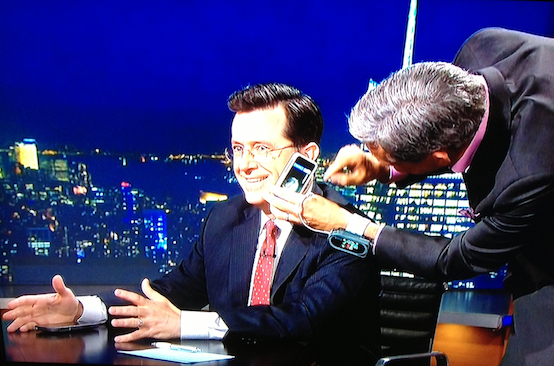 It's possible that folks in the industry can be a little too quick to call out signs of the times that mobile health has "gone mainstream" or "hit the big leagues." But there certainly have been some strong signs lately. Samsung announced mobile health features as a key part of its release strategy for the Galaxy S4. The House of Representatives hosted three days to holding hearings on mobile health regulation. And Scripps Health Chief Academic Officer and de facto digital health ambassador Eric Topol went on NBC's Rock Center with Brian Williams to talk about digital health tools.
It's possible that folks in the industry can be a little too quick to call out signs of the times that mobile health has "gone mainstream" or "hit the big leagues." But there certainly have been some strong signs lately. Samsung announced mobile health features as a key part of its release strategy for the Galaxy S4. The House of Representatives hosted three days to holding hearings on mobile health regulation. And Scripps Health Chief Academic Officer and de facto digital health ambassador Eric Topol went on NBC's Rock Center with Brian Williams to talk about digital health tools.
But now digital health has really arrived, because Topol has appeared on "The Colbert Report" to educate comedian and satirist Stephen Colbert about his book, "The Creative Destruction of Medicine", and about the digital health space in general.
"Why would we want to creatively destroy medicine?" Colbert asked at the start of the interview. "Medicine is keeping us alive! Leave it alone."
Topol explained that the appeal of digital health lies in highly personalized medicine, delivered via the smartphone.
"Well, you know what is going to be different is that smartphone is going to be a conduit of data and information about your health, about your medical essence, like you never had before," he said.
Making the most of the brief interview, Topol demonstrated some of his standby mobile health technologies: the AliveCor ECG heart monitor and the ViSi Mobile Monitor from Sotera Wireless. Taking a cue from a tweet in which Colbert had complained of a ruptured ear drum, Topol produced a CellScope smartphone-enabled otoscope, and showed Colbert's fans the inside of his ear, eliciting cheers from the Colbert Nation.
Throughout the demo, Colbert seemed genuinely impressed with the technology, asking Topol "How is it doing that?" and, in the case of the wristworn ViSi, "Are you Dick Tracy?"
Of course, tonight isn't the first time Colbert has acknowledged the burgeoning field of mobile health. It's just that every time up until now he's been mocking a new product, service or study, including some of the more prominent companies we report on at MobiHealthNews. Most of these products found their way into Colbert's sights via his "Cheating Death" segment, an occasional feature on healthcare news.
In March of 2010, Colbert reported on Vitality's Glowcaps, poking fun (perhaps deservedly) at the company's infomercial and observing that "While old people can be forgetful, they are great when it comes to setting up the Internet, recognizing cellphone ring tones, and checking voicemail messages."
In December 2010, Colbert picked up a UK news story about technology that would allow cellphones to detect STDs through a urine test, commenting on the awkwardness of the imagined use case.
Colbert's next digital health target was a company Topol often mentions in his presentations, ingestible sensor makers Proteus Digital Health. In August 2012, Colbert pointed out the irony of treating schizophrenia (listed by the company as a possible use case at one time) with sensors a corporation sends into your body that communicate with other people via your cellphone.
Most recently, just this year, Colbert joined the media storm reporting on the HAPIFork smart fork out of CES in Las Vegas. This wasn't on Cheating Death, but instead on "Tip of the Hat, Wag of the Finger" where the product got a wag from the comedian for being un-American in its attempts to limit consumption.
Perhaps Colbert's meeting with Topol will make him more sympathetic the next time he reports on digital health.
UPDATE: Here's a link to the video of Dr. Topol's segment on the show.



















